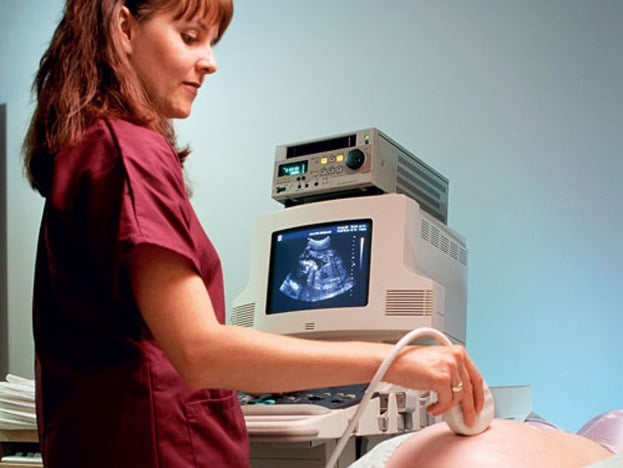
In the early weeks of pregnancy it’s difficult to hear the baby’s heartbeat using a traditional horn stethoscope or even a Doppler (a monitor that amplifies the sound of the baby’s heartbeat). At month two, a scan is usually done to confirm the pregnancy, measure the size of the baby and identify the tiny beating heart.
It’s a magical moment when this primitive, tube-shaped organ can be clearly seen on the scanner screen. The baby is measured from head to rump (bottom) which should be 6mm or the size of a grain of rice. Although this is an exciting and important moment for every pregnant couple, it can also be worrying when the heartbeat is missing.
If the pregnancy test is positive and the doctor is unable to find the heartbeat on scan, an appointment is made for a second scan – usually the following week (or even longer). The missing heartbeat may be an incorrect calculation of the conception date, and the baby maybe younger than was originally thought to be. ‘Extra padding’, when mom is plus-size may make it more difficult to hear the baby’s heartbeat, but this does not affect the scan in any way.
If the woman is sure of her dates and there is still no heartbeat, if she is bleeding (even just spotting) and the baby does not measure 6mm on the scan, this could be an indication that the pregnancy is not progressing. This will inevitably become a spontaneous miscarriage. Women who go through this experience may have had a gut-feeling that she didn’t ‘feel’ pregnant. This instinct can be a blessing because it may help to soften the news when the doctor confirms the diagnosis and has no choice but to booka D&C (dilatation and curettage) to end the pregnancy.
The baby’s heart begins beating from day 22 to 28 after conception. During pregnancy, labour and birth, the baby’s heartbeat is a good indication of the baby’s health. From this primitive stage, the contracting heart circulates blood, nutrition and oxygen from the placenta to every tiny dividing cell of the baby’s developing body.
The first 22 days after conception are crucial for the embryo. During this time one single ovum (egg) and the sperm, race against time first to meet, then fuse and nd the womb at the end of the fallopian tube. Finally it implants itself into the womb lining (endometrium) on about day ten. By day 22 the embryo needs to be prepared for the heart to start beating.
The developing embryo depends on mega-doses of progesterone from the ovary to keep it alive. The embryo is racing against time to survive independently. Although the sperm can enjoy the comfort-zone of the cervix (mouth of the womb) for as many as five days after ejaculation, the ova, once released, must be fertilised within 24 hours. The fertilised egg has only eight to ten days to journey through the fallopian tube before reaching the womb. Any delay or obstruction in this tube will result in a ‘tubal pregnancy’. Once this ‘cluster of cells’ (called a blastocyst) anchors itself to the wall of the womb, the placental cells connect with the endometrium.
High progesterone levels make a woman feel pregnant. Her breasts feel different – tender, sensitive and fuller than usual. She may feel nauseas with mouthfuls of saliva and her energy levels sap. When progesterone levels are not high enough to sustain the pregnancy, the woman will not experience these symptoms even if her pregnancy test is positive. Women who have had IVF (In-Vitro Fertilisation) or those who have miscarried before may be given progesterone injections or tablets in early pregnancy to prevent this from happening again.
When the baby’s heartbeat does not show on the scan, the doctor may take blood to test for levels of progesterone (which are usually ten times higher during pregnancy). Coupled with a second scan that does not identify a heartbeat and blood results with low progesterone levels, the doctor will book a D&C.




 Publications
Publications
 Partners
Partners














